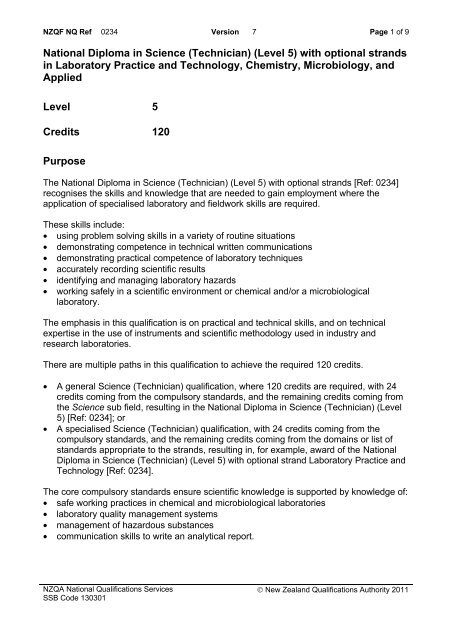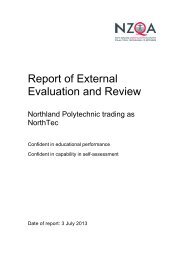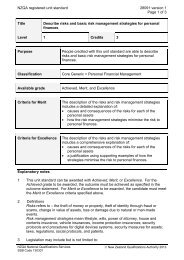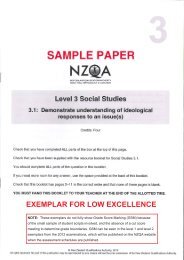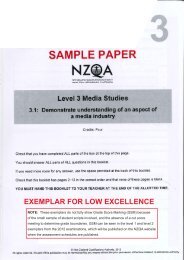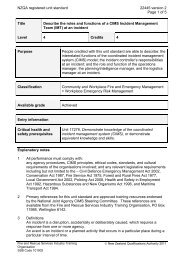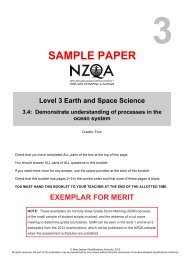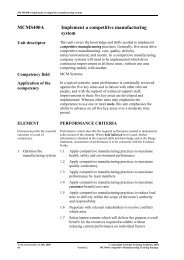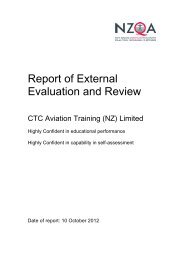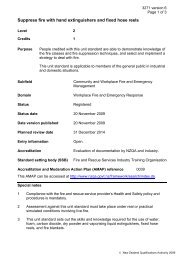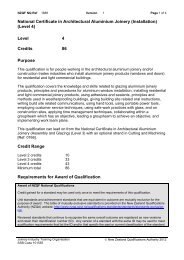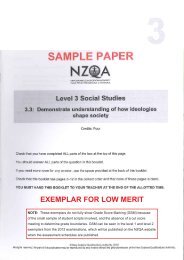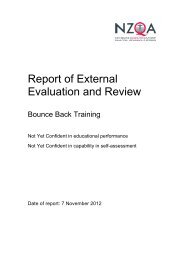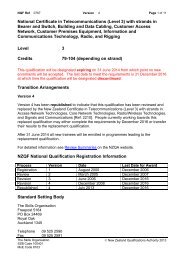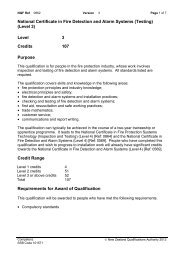National Diploma in Science (Technician) (Level 5) with ... - NZQA
National Diploma in Science (Technician) (Level 5) with ... - NZQA
National Diploma in Science (Technician) (Level 5) with ... - NZQA
You also want an ePaper? Increase the reach of your titles
YUMPU automatically turns print PDFs into web optimized ePapers that Google loves.
NZQF NQ Ref 0234 Version 7 Page 1 of 9<br />
<strong>National</strong> <strong>Diploma</strong> <strong>in</strong> <strong>Science</strong> (<strong>Technician</strong>) (<strong>Level</strong> 5) <strong>with</strong> optional strands<br />
<strong>in</strong> Laboratory Practice and Technology, Chemistry, Microbiology, and<br />
Applied<br />
<strong>Level</strong> 5<br />
Credits 120<br />
Purpose<br />
The <strong>National</strong> <strong>Diploma</strong> <strong>in</strong> <strong>Science</strong> (<strong>Technician</strong>) (<strong>Level</strong> 5) <strong>with</strong> optional strands [Ref: 0234]<br />
recognises the skills and knowledge that are needed to ga<strong>in</strong> employment where the<br />
application of specialised laboratory and fieldwork skills are required.<br />
These skills <strong>in</strong>clude:<br />
• us<strong>in</strong>g problem solv<strong>in</strong>g skills <strong>in</strong> a variety of rout<strong>in</strong>e situations<br />
• demonstrat<strong>in</strong>g competence <strong>in</strong> technical written communications<br />
• demonstrat<strong>in</strong>g practical competence of laboratory techniques<br />
• accurately record<strong>in</strong>g scientific results<br />
• identify<strong>in</strong>g and manag<strong>in</strong>g laboratory hazards<br />
• work<strong>in</strong>g safely <strong>in</strong> a scientific environment or chemical and/or a microbiological<br />
laboratory.<br />
The emphasis <strong>in</strong> this qualification is on practical and technical skills, and on technical<br />
expertise <strong>in</strong> the use of <strong>in</strong>struments and scientific methodology used <strong>in</strong> <strong>in</strong>dustry and<br />
research laboratories.<br />
There are multiple paths <strong>in</strong> this qualification to achieve the required 120 credits.<br />
• A general <strong>Science</strong> (<strong>Technician</strong>) qualification, where 120 credits are required, <strong>with</strong> 24<br />
credits com<strong>in</strong>g from the compulsory standards, and the rema<strong>in</strong><strong>in</strong>g credits com<strong>in</strong>g from<br />
the <strong>Science</strong> sub field, result<strong>in</strong>g <strong>in</strong> the <strong>National</strong> <strong>Diploma</strong> <strong>in</strong> <strong>Science</strong> (<strong>Technician</strong>) (<strong>Level</strong><br />
5) [Ref: 0234]; or<br />
• A specialised <strong>Science</strong> (<strong>Technician</strong>) qualification, <strong>with</strong> 24 credits com<strong>in</strong>g from the<br />
compulsory standards, and the rema<strong>in</strong><strong>in</strong>g credits com<strong>in</strong>g from the doma<strong>in</strong>s or list of<br />
standards appropriate to the strands, result<strong>in</strong>g <strong>in</strong>, for example, award of the <strong>National</strong><br />
<strong>Diploma</strong> <strong>in</strong> <strong>Science</strong> (<strong>Technician</strong>) (<strong>Level</strong> 5) <strong>with</strong> optional strand Laboratory Practice and<br />
Technology [Ref: 0234].<br />
The core compulsory standards ensure scientific knowledge is supported by knowledge of:<br />
• safe work<strong>in</strong>g practices <strong>in</strong> chemical and microbiological laboratories<br />
• laboratory quality management systems<br />
• management of hazardous substances<br />
• communication skills to write an analytical report.<br />
<strong>NZQA</strong> <strong>National</strong> Qualifications Services<br />
SSB Code 130301<br />
© New Zealand Qualifications Authority 2011
NZQF NQ Ref 0234 Version 7 Page 2 of 9<br />
The optional strands recognise the candidate’s skills which may <strong>in</strong>clude:<br />
• <strong>in</strong>terpret<strong>in</strong>g and report<strong>in</strong>g technical scientific results<br />
• report<strong>in</strong>g results <strong>in</strong> a clear, timely, and applicable format for <strong>in</strong>terpretation<br />
• us<strong>in</strong>g communication skills to convey <strong>in</strong>formation and <strong>in</strong>structions.<br />
The Laboratory Practice and Technology strand recognises laboratory practical skills from<br />
various science fields. The strand is designed to be flexible so that the provider can select<br />
practically assessed standards to recognise candidate’s competence <strong>in</strong> the practical skills<br />
that are practised <strong>in</strong> real laboratory contexts.<br />
The Microbiology and Chemistry strands recognise knowledge and skills <strong>in</strong> their respective<br />
fields. The strand is designed to be flexible so that the provider can select practically<br />
assessed standards <strong>in</strong> Microbiology, Immunology, Molecular – Biology and <strong>Science</strong> - Core<br />
or standards which assess knowledge <strong>in</strong> these doma<strong>in</strong>s. Similarly the Chemistry strand is<br />
designed to be flexible so that the provider can select practically assessed standards <strong>in</strong><br />
Chemistry, Biochemistry and <strong>Science</strong> – Core or standards which assess knowledge <strong>in</strong><br />
these doma<strong>in</strong>s.<br />
The Applied optional strand <strong>in</strong>cludes the standard 26346, <strong>in</strong> <strong>Science</strong> – Core, that requires<br />
candidates to undertake practical work experience <strong>in</strong> a research or <strong>in</strong>dustrial laboratory<br />
and allows recognition of that experience. This is a standard that recognises a significant<br />
and specific outcome related to the application of the skills and techniques acquired <strong>in</strong> a<br />
teach<strong>in</strong>g and learn<strong>in</strong>g environment. Candidates that have been recognised for this<br />
standard have shown the ability to work <strong>in</strong> an <strong>in</strong>dustrial or research laboratory and are able<br />
to apply scientific skills to execute a scientific process, record data and results from the<br />
performance of a scientific process, and write a scientific report based on the recorded<br />
data and results of the scientific process performed.<br />
<strong>Technician</strong>s would be able to perform tasks as required by <strong>in</strong>dustrial and research<br />
laboratories; they would demonstrate competency <strong>in</strong> rout<strong>in</strong>e laboratory tasks as required<br />
by this scientific environment; and they would be able to use a range of relevant technical<br />
equipment and have the competence and ability to practice safe laboratory techniques.<br />
This qualification builds on scientific skills and knowledge acquired from secondary school,<br />
the <strong>National</strong> Certificate <strong>in</strong> <strong>Science</strong> (<strong>Level</strong> 4) [Ref: 1669], the <strong>National</strong> Certificate <strong>in</strong> <strong>Science</strong><br />
(<strong>Level</strong> 5) [Ref: 1670], or related qualifications. It can lead to the <strong>National</strong> <strong>Diploma</strong> <strong>in</strong><br />
<strong>Science</strong> (Advanced <strong>Technician</strong>) (<strong>Level</strong> 6) <strong>with</strong> optional strands <strong>in</strong> Laboratory Practice and<br />
Technology, Chemistry, Microbiology, and Applied [Ref: 0235] or an equivalent<br />
qualification. It provides a sound platform for employment and/or further study towards<br />
higher specialist science qualifications and/or science qualifications related to the<br />
workplace or to university study.<br />
Credit Range<br />
Core Compulsory Core Elective Balance<br />
<strong>Level</strong> 4 credits 19 - 0-16<br />
<strong>Level</strong> 5 credits 5 0-80 0-16<br />
<strong>Level</strong> 6 or above credits - 0-80 0-16<br />
M<strong>in</strong>imum totals 24 80 -<br />
<strong>NZQA</strong> <strong>National</strong> Qualifications Services<br />
SSB Code 130301<br />
© New Zealand Qualifications Authority 2011
NZQF NQ Ref 0234 Version 7 Page 3 of 9<br />
Based on credits selected <strong>with</strong><strong>in</strong> the Core Elective candidates can be awarded one of the<br />
follow<strong>in</strong>g optional strands <strong>in</strong> recognition of their specialisation <strong>in</strong> a particular area.<br />
Laboratory Practice and<br />
Technology Optional<br />
Strand<br />
Chemistry<br />
Optional<br />
Strand<br />
Set A Set B<br />
<strong>Level</strong> 4 credits 0-27 0-4 - -<br />
<strong>Level</strong> 5 or above credits 0-16 0-30 50 50<br />
M<strong>in</strong>imum totals for strand 50 50 50<br />
Microbiology<br />
Optional<br />
Strand<br />
Based on selection of standard 26346 candidates can be awarded the Applied optional<br />
strand <strong>in</strong> recognition of their practical work experience <strong>in</strong> a research or <strong>in</strong>dustrial<br />
laboratory.<br />
Applied Optional Strand<br />
<strong>Level</strong> 5 10<br />
M<strong>in</strong>imum totals for strand 10<br />
Requirements for Award of Qualification<br />
Award of NZQF <strong>National</strong> Qualifications<br />
Credit ga<strong>in</strong>ed for a standard may be used only once to meet the requirements of this qualification.<br />
Unit standards and achievement standards that are equivalent <strong>in</strong> outcome are mutually exclusive for the<br />
purpose of award. The table of mutually exclusive standards is provided on the New Zealand Qualifications<br />
Authority (<strong>NZQA</strong>) website: http://www.nzqa.govt.nz/qualifications-standards/standards/standards-exclusionlist/.<br />
Reviewed standards that cont<strong>in</strong>ue to recognise the same overall outcome are registered as new versions<br />
and reta<strong>in</strong> their identification number (ID). Any version of a standard <strong>with</strong> the same ID may be used to meet<br />
qualification requirements that list the ID and/or that specify the past or current classification of the standard.<br />
Summary of Requirements<br />
• A m<strong>in</strong>imum of 120 credits at <strong>Level</strong> 4 or above<br />
• Core Compulsory standards<br />
• Core Elective – A m<strong>in</strong>imum of 80 credits as specified<br />
• Balance – Balance if required<br />
The follow<strong>in</strong>g strands are optional<br />
• Laboratory Practice and Technology Optional Strand<br />
• Chemistry Optional Strand<br />
• Microbiology Optional Strand<br />
• Applied Optional Strand<br />
<strong>NZQA</strong> <strong>National</strong> Qualifications Services<br />
SSB Code 130301<br />
© New Zealand Qualifications Authority 2011
NZQF NQ Ref 0234 Version 7 Page 4 of 9<br />
Detailed Requirements<br />
Core Compulsory<br />
The follow<strong>in</strong>g standards are required<br />
Humanities > Communication Skills > Writ<strong>in</strong>g<br />
ID Title <strong>Level</strong> Credit<br />
9685 Write an analytical report 5 5<br />
<strong>Science</strong>s > <strong>Science</strong> > Chemistry<br />
ID Title <strong>Level</strong> Credit<br />
26341 Perform titrimetric analyses 4 6<br />
<strong>Science</strong>s > <strong>Science</strong> > Microbiology<br />
ID Title <strong>Level</strong> Credit<br />
8040 Perform aseptic laboratory techniques 4 4<br />
<strong>Science</strong>s > <strong>Science</strong> > <strong>Science</strong> - Core<br />
ID Title <strong>Level</strong> Credit<br />
8029 Work safely <strong>in</strong> a microbiological laboratory 4 2<br />
8466 Demonstrate competent use of laboratory<br />
4 4<br />
measurement and record<strong>in</strong>g procedures<br />
8467 Work safely <strong>in</strong> a chemical laboratory 4 3<br />
Core Elective<br />
A m<strong>in</strong>imum of 80 credits at <strong>Level</strong> 5 or above<br />
Field Subfield Doma<strong>in</strong><br />
<strong>Science</strong>s <strong>Science</strong> Any<br />
Balance<br />
The balance of credits to achieve<br />
A m<strong>in</strong>imum of 120 credits at <strong>Level</strong> 4 or above<br />
May come from anywhere on the DAS<br />
Laboratory Practice and Technology Optional Strand<br />
A m<strong>in</strong>imum of 50 credits<br />
From the follow<strong>in</strong>g sets<br />
• Set A<br />
• Set B<br />
<strong>NZQA</strong> <strong>National</strong> Qualifications Services<br />
SSB Code 130301<br />
© New Zealand Qualifications Authority 2011
NZQF NQ Ref 0234 Version 7 Page 5 of 9<br />
Set A<br />
A maximum of 30 credits<br />
<strong>Science</strong>s > <strong>Science</strong> > Biochemistry<br />
ID Title <strong>Level</strong> Credit<br />
8043 Perform spectrophotometric analyses 5 3<br />
8044 Perform laboratory centrifugation techniques 4 1<br />
26486 Perform paper, th<strong>in</strong> layer, and column chromatography 5 4<br />
<strong>Science</strong>s > <strong>Science</strong> > Chemistry<br />
ID Title <strong>Level</strong> Credit<br />
8436 Demonstrate laboratory solvent and distillation<br />
4 5<br />
separation techniques<br />
8439 Perform titrations 5 5<br />
8453 Perform qualitative anion and cation analysis 4 3<br />
9242 Perform titrimetric analysis us<strong>in</strong>g colour <strong>in</strong>dicators 4 5<br />
12363 Demonstrate knowledge of chromatography systems 5 4<br />
16566 Perform organic chemistry functional group analysis 4 5<br />
26342 Perform gravimetric analyses 4 4<br />
<strong>Science</strong>s > <strong>Science</strong> > <strong>Science</strong> - Core<br />
ID Title <strong>Level</strong> Credit<br />
8091 Use and ma<strong>in</strong>ta<strong>in</strong> a light microscope 4 2<br />
26344 Use a laboratory <strong>in</strong>formation management system 4 2<br />
Set B<br />
A maximum of 30 credits<br />
<strong>Science</strong>s > <strong>Science</strong> > Biology<br />
ID Title <strong>Level</strong> Credit<br />
8097 Analyse field measurements of plants 5 4<br />
8098 Analyse field measurements of animals 5 4<br />
26420 Perform histological techniques 5 4<br />
<strong>NZQA</strong> <strong>National</strong> Qualifications Services<br />
SSB Code 130301<br />
© New Zealand Qualifications Authority 2011
NZQF NQ Ref 0234 Version 7 Page 6 of 9<br />
<strong>Science</strong>s > <strong>Science</strong> > Microbiology<br />
ID Title <strong>Level</strong> Credit<br />
8023 Demonstrate and apply knowledge of microorganism 5 6<br />
biochemical pathways<br />
8033 Culture and identify fungi to division level 5 3<br />
8035 Carry out visualisation and measurement of<br />
4 4<br />
microorganisms<br />
8037 Describe and identify major groups of protozoa 5 2<br />
8038 Perform viable microbiological count<strong>in</strong>g methods 5 3<br />
8042 Apply pr<strong>in</strong>ciples of bacterial identification 5 6<br />
26109 Culture microorganisms 5 4<br />
26110 Control microbial growth 5 3<br />
<strong>Science</strong>s > <strong>Science</strong> > Molecular Biology<br />
ID Title <strong>Level</strong> Credit<br />
8050 Perform electrophoresis 5 3<br />
Chemistry Optional Strand<br />
A m<strong>in</strong>imum of 50 credits at <strong>Level</strong> 5 or above<br />
Field Subfield Doma<strong>in</strong><br />
<strong>Science</strong>s<br />
<strong>Science</strong><br />
Biochemistry<br />
Chemistry<br />
<strong>Science</strong> - Core<br />
Microbiology Optional Strand<br />
A m<strong>in</strong>imum of 50 credits at <strong>Level</strong> 5 or above<br />
Field Subfield Doma<strong>in</strong><br />
<strong>Science</strong>s<br />
<strong>Science</strong><br />
Immunology<br />
Microbiology<br />
Molecular Biology<br />
<strong>Science</strong> - Core<br />
Applied Optional Strand<br />
The follow<strong>in</strong>g standard is required<br />
<strong>Science</strong>s > <strong>Science</strong> > <strong>Science</strong> - Core<br />
ID Title <strong>Level</strong> Credit<br />
26346 Write a scientific report based on results of a scientific<br />
process <strong>in</strong> an <strong>in</strong>dustrial or research laboratory<br />
5 10<br />
<strong>NZQA</strong> <strong>National</strong> Qualifications Services<br />
SSB Code 130301<br />
© New Zealand Qualifications Authority 2011
NZQF NQ Ref 0234 Version 7 Page 7 of 9<br />
Transition Arrangements<br />
Version 7<br />
Version 7 was issued follow<strong>in</strong>g review.<br />
Changes to structure and content<br />
• Overall credit value was reduced from 240 to 120.<br />
• Credit value of the Core Compulsory section was <strong>in</strong>creased from 4 to 24, and<br />
standards 8040, 8466, 9685, and 26341 were added to it.<br />
• Standards 8029 and 8467 were moved from the old Core Elective to the Core<br />
Compulsory.<br />
• The compulsory standard 8441 was removed from the qualification.<br />
• The <strong>Science</strong> Elective was replaced <strong>with</strong> a new Core Elective which allows credits from<br />
the <strong>Science</strong> subfield.<br />
• Optional strands were added <strong>in</strong> Laboratory Practice and Technology, Chemistry,<br />
Microbiology and Applied.<br />
• The Mathematics, Communication, and Information Technology electives were<br />
removed from the qualification.<br />
For detailed <strong>in</strong>formation see Review Summaries on the <strong>NZQA</strong> website.<br />
This qualification conta<strong>in</strong>s standards that replace earlier standards. For the purposes of<br />
this qualification, people who have ga<strong>in</strong>ed credit for the expir<strong>in</strong>g standards are exempt<br />
from the requirement to ga<strong>in</strong> credit for the replacement standards – see table below.<br />
Credit for<br />
Exempt from<br />
8435 26341, 26342<br />
8045, 8047 26486<br />
Candidates may either complete the requirements for version 6 or transfer to version 7.<br />
Last date for entry lead<strong>in</strong>g to version 6 of the qualification is December 2014.<br />
All new candidates <strong>in</strong> 2015 will be enrolled <strong>in</strong> programmes lead<strong>in</strong>g to version 7 of the<br />
qualification.<br />
Programmes lead<strong>in</strong>g to the award of version 7 of the qualification can beg<strong>in</strong> upon<br />
registration of this version.<br />
Previous versions of the qualification<br />
Version 6 was issued follow<strong>in</strong>g a review of the qualification. The qualification was<br />
structured to <strong>in</strong>clude quality systems and safety standards as requirements <strong>in</strong> the<br />
qualification. Version 6 <strong>in</strong>cluded credit exemptions on the basis of NZCS subject passes.<br />
These transition arrangements expired on 31 December 2005.<br />
Version 5 was issued to <strong>in</strong>troduce new transition and credit transfer arrangements.<br />
<strong>NZQA</strong> <strong>National</strong> Qualifications Services<br />
SSB Code 130301<br />
© New Zealand Qualifications Authority 2011
NZQF NQ Ref 0234 Version 7 Page 8 of 9<br />
Version 4 was issued to correct an error <strong>in</strong> the transition action plan and to take account of<br />
a review of Bus<strong>in</strong>ess Adm<strong>in</strong>istration standards.<br />
Version 3 was issued follow<strong>in</strong>g a review of the qualification. The qualification was<br />
structured <strong>in</strong>to four elective sets, and four additional standards and a subfield were<br />
<strong>in</strong>cluded <strong>in</strong> the electives.<br />
NZQF <strong>National</strong> Qualification Registration Information<br />
Process Version Date Last Date for Assessment<br />
Registration 1 November 1996 December 2005<br />
Revision 2 April 1998 December 2005<br />
Review 3 September 1998 December 2005<br />
Revision 4 July 2000 December 2005<br />
Revision 5 February 2004 December 2007<br />
Review 6 January 2005 December 2016<br />
Review 7 June 2011 N/A<br />
Standard Sett<strong>in</strong>g Body<br />
<strong>NZQA</strong> <strong>National</strong> Qualifications Services<br />
PO Box 160<br />
Well<strong>in</strong>gton 6140<br />
Telephone 04 463 3000<br />
Email nqs@nzqa.govt.nz<br />
Planned Review<br />
Any person or organisation may contribute to the review of this qualification by send<strong>in</strong>g<br />
feedback to the standard sett<strong>in</strong>g body at the above address.<br />
Next Review 2015<br />
Certification<br />
This certificate will display the logos of <strong>NZQA</strong> and the organisation that has been granted<br />
consent to assess aga<strong>in</strong>st standards that meet the requirements of the qualification<br />
(accredited).<br />
<strong>NZQA</strong> <strong>National</strong> Qualifications Services<br />
SSB Code 130301<br />
© New Zealand Qualifications Authority 2011
NZQF NQ Ref 0234 Version 7 Page 9 of 9<br />
Classification<br />
This qualification is classified accord<strong>in</strong>g to the classification system listed on the Directory<br />
of Assessment Standards (DAS) and the New Zealand Standard Classification of<br />
Education (NZSCED) system as specified below.<br />
DAS Classification<br />
NZSCED<br />
Code Description Code Description<br />
316 <strong>Science</strong>s > <strong>Science</strong> 019909 Natural and Physical <strong>Science</strong>s ><br />
Other Natural and Physical<br />
<strong>Science</strong>s > Laboratory<br />
Technology<br />
Quality Management Systems<br />
Providers and Industry Tra<strong>in</strong><strong>in</strong>g Organisations must be granted consent to assess by a recognised Quality<br />
Assurance Body before they can register credits from assessment aga<strong>in</strong>st standards. Organisation <strong>with</strong><br />
consent to assess and Industry Tra<strong>in</strong><strong>in</strong>g Organisations assess<strong>in</strong>g aga<strong>in</strong>st standards must engage <strong>with</strong> the<br />
moderation system that applies to those standards. Consent to assess requirements and the moderation<br />
system are outl<strong>in</strong>ed <strong>in</strong> the associated Consent and Moderation Requirements (CMR) for each standard.<br />
<strong>NZQA</strong> <strong>National</strong> Qualifications Services<br />
SSB Code 130301<br />
© New Zealand Qualifications Authority 2011


